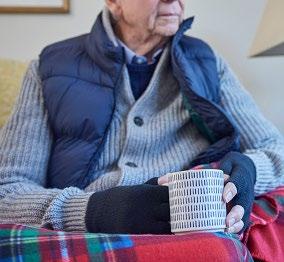
2 minute read
Financial Support
from Carers' Guide
by age_ni
Help with heating costs
Many of us worry about rising fuel costs, but a cold home puts us at risk of coldrelated illnesses such as pneumonia. If you have reached State Pension age (the minimum age at which you qualify for Pension Credit), or receive certain benefits, you can get extra money to help you in winter.
Advertisement

Winter Fuel Payment
The Winter Fuel Payment is an annual payment to help with heating costs, made to households that include someone over State Pension age. In 2022/23 the payments were £200 if you’re under 80 or £300 if you’re 80 or over. You’ll usually get less if you live with other people who also qualify – but, between you, it should add up to the same.
You usually get a Winter Fuel Payment automatically if you get the State Pension or Pension Credit. You’ll receive a letter with the amount and the approximate payment date.
If you don’t receive the State Pension or Pension Credit but might be eligible, you need to make a claim by contacting: Winter Fuel Payment Centre on 0800 731 0160.
You can also download the claim form by visiting: www.gov.uk/winter-fuelpayment/how-to-claim
You’ll need your National Insurance number and Bank or Building Society details to hand. You only have to claim once. After that, you should get the payment automatically each year – as long as your circumstances don’t change.
Cold Weather Payment
If the average temperature in your area has been, or is expected to be, 0ºC (32ºF) or below for seven days in a row between November and March, you should get a payment of £25 a week.
You should automatically receive a Cold Weather Payment if you get Guarantee Pension Credit.
Contact the Northern Ireland Pension Centre on 0800 587 0892 if you think you should have received a Cold Weather Payment but didn’t.
Help with Health Costs
In Northern Ireland everyone is eligible for free prescriptions. When you reach 60, you can also get a free sight test.
If you receive the Guarantee Credit part of Pension Credit, you automatically qualify for help towards additional health costs including:
• free dental treatment
• an eye test once a year
• a voucher towards the cost of glasses or contact lenses
• free wigs and fabric supports
• help with necessary travel costs to receive healthcare treatment if you’re referred by a doctor, dentist or need to see a consultant.
If you don’t get the Guarantee Credit part of Pension Credit but have a low income and less than £16,000 in property, savings or any other money (either on your own or jointly if you’re a couple), you may still get some help with these costs through the Health Service Low Income Scheme.
You may also be eligible for this scheme if you live permanently in a care home and have savings of less than £23,250.
For information visit www.nidirect.gov. uk/articles/help-health-costs#toc-1
Help with one off or urgent expenses
If you’re faced with a cost you can’t meet because of your low income, or you find yourself without any money at all, you may be able to get help from the Finance Support service. The Finance Support service includes:
• Discretionary support, which is an interest free loan or grant that can help you if you are faced with an exceptional or crisis situation. Discretionary support replaces community care grants and crisis loans for household items and living costs.
• A Budgeting Loan of between £100 and £1500 may be available if you’re receiving Pension Credit and you need to pay for an essential item. You’ll need to repay it out of your weekly benefits.
• A Short-Term Advance can help to tide you over between claiming a benefit and receiving it. You’ll usually need to repay the money within three months, out of your weekly benefits.
• Funeral Payments can help you cover the cost of a funeral, such as burial or cremation costs and up to £1000 for other expenses, such as the funeral director’s fees.
For information visit: www.nidirect. gov.uk/contacts/finance-supportservice-times-crisis-and-need








